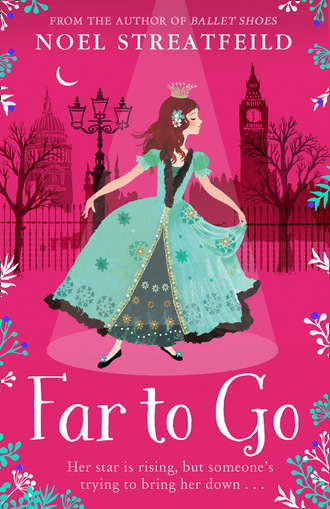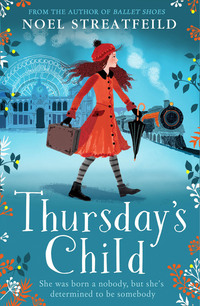
Полная версия
Far To Go
Next came the problem of what Margaret was to wear. The choice was small. She owned one blue pleated skirt worn with a darker blue knitted jersey. Both were the worse for wear. She had two cotton frocks made for her by Sarah. They were of the cheapest cotton but more or less in the fashion, for they came well below the knees and both had a little frill round the bottom, but it was too late in the year for cotton frocks. There were also two pinafores beautifully made by Sarah from some odds and ends of muslin and lace left over from stage dresses.
‘The cotton frocks are out,’ said Sarah, ‘for she hasn’t got a coat.’
Lou was not a person who gave in easily. After all, was she not second to the wardrobe mistress at the London Hippodrome, where could be seen the most lavish production of Cinderella ever staged? Now, easing herself into the only chair big enough for her, she gave herself to deep thought.
‘She’s a rare one for seein’ the way out of blind alleys is Lou,’ Sarah whispered, ‘which of course she often has to do in her position.’
Suddenly Lou, who had for a few minutes appeared to be asleep, jerked upright.
‘I have it. There’s me crimson. I don’t know when I last wore it.’
She forced herself out of the chair, went to her cupboard and, after some fumbling, produced an armload of dress. It was made of material called bombazine and was the same red as a pillar-box. She had worn it in the days of bustles so there was a quantity of material in it.
‘There!’ she said. ‘Isn’t that striking?’ It was indeed striking, perhaps too striking, for she added: ‘She could wear one of her pinnies over, that would tone it down.’
‘Can we make it in the time?’ Sarah asked doubtfully.
Lou looked despisingly at her sister. ‘Time! I could make four in the time if I had to. Now, clear the table …’
They pulled the table out from the wall and pushed aside the remains of breakfast. Then Lou lifted the dress on to the table.
‘I’ll cut it out, then you tack it together, Sarah, then I can run it round to the theatre to finish it on one of their sewing machines. You have an iron ready to press it and it will all be Sir Garnet.’
And, as far as Sarah was concerned, it was all Sir Garnet when at 11.25 a.m. she and Margaret arrived at the stage door of The Dolphin Theatre. Margaret was less happy. She was not herself in the scarlet frock, which was somehow stuffy and clung to her in the wrong places.
‘Cheer up, dear,’ said Sarah, ‘you look ever so nice. I’m sure they’ll take you.’ Then she opened the stage door and said to the doorkeeper: ‘Miss Thursday with an appointment to see Mr Smith.’
Chapter Four
THE INTERVIEW
Sir John was with his manager, Tommy Smith, when the message was received that Margaret had arrived.
‘Then I will get out of the way,’ said Sir John.
‘Stay and see the child,’ Tommy pleaded. ‘Then you will understand what an impossible task you’ve given me. I’ve seen dozens but they are all curls and smiles. No character in any of them.’
‘I could not be fair to any child,’ Sir John objected, ‘for you know my heart is set on Katie.’
‘Is her ladyship adamant?’ Tommy asked.
‘Absolutely. I’ve pleaded with her until I am exhausted. Katie is not to go on the stage.’
Tommy smiled. ‘I would lay a bet that when she is grown up Miss Katie will have her own views about that.’
Outside the door there was whispering.
‘No, thank you, Sarah. I will see Mr Smith myself.’
‘I do think I should come in, dear. It’s not seemly you going in on your own.’
‘All the same, I shall go alone.’
Then there was a knock on the door.
When she was wearing her skirt and jersey Margaret’s dyed hair was not too noticeable, but when it was seen against a bright scarlet frock the effect was startling. And when, to finish off the outfit, there were thin legs in black woollen stockings and black boots, poor Margaret was a figure of fun.
Sir John gave Tommy a look and buried his face in his handkerchief. Tommy hid his behind a letter.
Margaret had not liked the idea of the red dress from the beginning. Nor had she wanted her hair dyed for Fauntleroy, though she had liked the effect when it was done, so she did not need even well-disguised sniggers to tell her how she appeared to the two men. Carefully she closed the door so Sarah would not hear, then, her eyes blazing and her chin in the air, she stormed towards Tommy’s desk.
‘All right – laugh. I may look funny to you. I had nothing they thought suitable for me to wear to come and see you. So Lou – she’s Sarah’s sister – cut up her own dress to make me this frock, and my hair is dyed because I was acting Lord Fauntleroy, but when the dye is out it’s brown like a chestnut. Oh yes, and I suppose you think the boots are funny with this red dress, but they’re all I have and, if you want to know, I hate boots. But I am not a charity child though I was once in an orphanage. I was found by the rector in a basket with three of everything, all of the very best quality, and money was sent every year for my keep and … and—’
There, to her shame, Margaret had to stop for she was overtaken by grief. She had felt like a person with the Fortescue Company, accepted by them all as an actress, and now there were these sniggering men! Swallow as she would, she could not stop the tears which poured down her cheeks.
Sir John was not a loving father for nothing. He came to Margaret and lifted her face in his hands. ‘You’re right to be angry. We were very rude to smile. But being angry may have helped you. Anastasia, in the play I am casting, has to be angry, and when she is angry she should look very much like you. Now, let’s start all over again.’
An hour later a triumphant Margaret and Sarah left The Dolphin Theatre, Margaret clutching the script of The Little Queen. She had not been promised the part but there was a good chance for her, and at the worst she was to have the understudy.
‘You will get two pounds a week to understudy,’ Tommy explained, ‘and four pounds if you play the part.’
Sarah had been brought in to hear the arrangements and she plucked up her courage to ask a question.
‘If she is engaged could she have a small advance for clothes?’
Margaret was furious. ‘I don’t need charity, thank you. I’ve got my skirt and jersey and …’
‘But no coat,’ Sarah pleaded, ‘and the winter coming on.’
Sir John, who had stayed for this discussion, broke in: ‘I’m sure I can help there. I have a little girl just your age. I will speak to Lady Teaser. I’m sure she has cupboards full of frocks and fal-lals she will never use.’ He saw Margaret’s eyes beginning to flash. ‘Don’t be angry with me. It’s a very sensible suggestion, for I am sure Mrs Beamish here will be able to alter them to fit you. Then you can keep that red dress for parties.’
‘Study the part at the pages I’ve marked,’ said Tommy. ‘Then come back at three o’clock tomorrow and perhaps we will have some clothes ready for you.’
Margaret had the last word.
‘I could manage, my jersey and skirt are quite good and I expect I could buy a second-hand coat.’
When Margaret and Sarah had gone, Tommy and Sir John solemnly shook hands.
Then Sir John said: ‘If she can lose her temper when she’s acting as she does in life that little girl is the find of the new century.’
Katie was in her own way a beauty. She wore her hair cut very short, almost like a boy’s. It was rather fine hair and her mother believed that if she wore it short as a child it would be thick and glossy when she grew up. She was a quiet, studious child with her head always buried in a book. Her mother said she was a great reader, but Katie and her governess, Miss Grey, knew the books she read were mostly play scripts passed on to the schoolroom secretly by the theatre manager, whom she called Uncle Tommy. She also read and reread Shakespeare’s plays and knew most of the women’s parts by heart.
Miss Grey was the daughter of a country parson. Her mother was dead and she came in the middle of a family of nine, and though the rectory where she was brought up was rent-free, the rector’s income was only one hundred pounds a year, so there were never even halfpennies to spare. But the rectory children had good brains and were determined to be educated. All the boys got scholarships to schools which offered special places to the sons of clergy, and the girls learned all the village school could teach them and then taught themselves from books. In addition they learnt a lot that no books could have taught them. How to stretch the hundred pounds so that they had enough to eat and were all covered, if not exactly dressed. As an aid to this the girls ran about barefoot even in the worst weather so that there were boots for the boys to take to school. Some sort of footwear they had every Sunday and for school, but these were curious homemade efforts. Those boys who were still at day school always walked to their school with their boots hung round their necks, only putting them on when the school was in sight.
The girls were good, too, with food. Everything that was edible and that grew wild was gathered in. They caught fish in a stream and snared rabbits. Miss Grey could keep Katie happy for hours describing her childhood.
‘It was hard, I suppose,’ she would say, ‘but we were happy and people were good to us. They loved my papa and would pass it on to us in little gifts of vegetables or perhaps eggs, and the squire gave us the run of his library for books. And we have all done well. I have three brothers who are doctors and two are in the Indian Civil Service and all my sisters are well and happily married.’
‘I’m glad you’re not married,’ Katie would say. ‘I’m so glad you have come to look after me.’
‘Coming here was just what I wanted,’ Miss Grey would say. ‘Although as a child I never went to a theatre, I always longed to. I read whatever I could find about the theatre but there is not much written. Then I saw your father’s advertisement in The Times newspaper. It gave his name and I went for an interview. I never thought he would take me for, now that everybody is to be educated, teachers are expected to be trained and play the piano, and certainly have fluent French and perhaps dancing …’
Katie laughed at the thought of Miss Grey in her thick shoes, worn sizes too big because she was used to running about barefoot, trying to teach dancing.
‘But I have outside teachers for all those, it’s you as a person I need. Papa was quite right, you are just perfect for me.’
That evening Sir John asked Ada about Katie’s old clothes.
‘I am hoping the child will do. She speaks nicely but it seems she was brought up by two ladies, and there is some romantic story about being found in a basket. Tommy says it will do for the newspapers if the child proves suitable. But something must be done about her clothes, she could not even attend rehearsals in what she has. Has Katie any old clothes and could someone fit out the child?’
Katie was charmingly dressed in soft fabrics in pastel shades, and to her mother dressing her was rather like dressing a doll, but the real fun was when there were new clothes to be made. Any day now she was planning to take Katie to the dressmaker to order her a winter wardrobe. Invariably, when a new season came round, what she always described as ‘that comical Miss Grey’ would say: ‘Oh, but there is a cupboard full of clothes scarcely worn.’ How convenient that this child had turned up now! She would give orders. Miss Grey was to fit the girl out.
‘You see to it, Miss Grey,’ she said. ‘Any of Katie’s old clothes should do, though not of course party frocks.’
Miss Grey went back to the schoolroom where she had left Katie writing an essay. She had closed the door, but even so she lowered her voice just in case Lady Teaser should be passing.
‘This afternoon the child they think will act in the new play is coming to try on some of your old clothes. Your mother did not mention you, but knowing how you enjoy meeting theatre folk I thought you might help me choose frocks for her.’
Katie seemed in one second to change from a rather bored child into a radiant one. The day which, like most days, had stretched drearily ahead for her, suddenly became special.
‘Oh!’ she said. ‘Thank you, Miss Grey. Wouldn’t it be perfect if we could become friends?’
Конец ознакомительного фрагмента.
Текст предоставлен ООО «ЛитРес».
Прочитайте эту книгу целиком, купив полную легальную версию на ЛитРес.
Безопасно оплатить книгу можно банковской картой Visa, MasterCard, Maestro, со счета мобильного телефона, с платежного терминала, в салоне МТС или Связной, через PayPal, WebMoney, Яндекс.Деньги, QIWI Кошелек, бонусными картами или другим удобным Вам способом.





